|
You Don't take a Mule to the
Kentucky Derby: UNC Board of Governors Bogus UNC
Greensboro white privilege Nanoscience MS and Ph.D. degrees.
|
| |
|
Its [UNCG] historically strong programs in music, education and
nursing are not the kinds of programs that spin off research and
development or software companies to fuel high tech economies
[Ken Mayer, Editorial, UNCG, A&T University
will need to be leaders in the charge for high-tech industry in the
Triad, Triad Business Journal Nov 9, 1998] ( Ken Mayer is former
Chairman UNCG BOT 2003-2004 & 2004-2005.] |
| |
| The National Center for
Educational Statistics (NCES) responsible for collecting and
presenting statistical data and information for the nation;
classifies Nanoscience and Nanoengineering as Nanotechnology CIP
15.1601: Engineering technologies and Engineering related fields. |
| |
|
Nanotechnology. Definition: A program that prepares
individuals to apply mathematical, scientific, and engineering
principles and technical skills to manipulate matter at the atomic
and molecular level (in the range of 1-100 nanometers) and to
design, fabricate, and integrate nanoscale structures, devices, and
systems. Includes instruction in materials science,
thermodynamics, nanomaterials, Nano electronics, and nano/micro
device fabrication and testing. [https://nces.ed.gov/search/?q=nano+science]: |
| |
 |
|
PCG/UNC-NCCCS/UNC
Interim report 3.doc/RB.SP.PC.CR.ATPCC.1/CC.14/10May05 |
|
| |
|
 |
|
University of North Carolina at Greensboro 2008-2009
Profile |
|
| |
|
 |
|
A degree program is a program of study in a
discipline specialty that leads to a degree in that distinct
specialty area at a particular level of instruction. As a general
rule, in order to be considered for degree program status, a course
of study should require at least 27 semester hours in the proposed
program area at the undergraduate level; at least half the number of
hours required for the degree at the master’s level; and at least 21
hours in the proposed program area at the doctoral level. [Adopted
05/06/09] |
| |
|
Notwithstanding the National Center for
Educational Statistics (NCES),
categorized Nanoscience as CIP 15.1601
Engineering Technologies and
Engineering-Related Fields.
UNC General
Administration applied
CIP 40.9999 (Physical
Science) to UNCG academic offering .
Note UNC-G has
a School of Arts and Science. |
 |
|
| Note
Fall 2005 UNC Presidency transition from
President
Molly Broad
to Erskine Bowles. |
|
| |
Professional Master of Science in Nanoscience
The 33-hour, non-thesis MS in Nanoscience
follows the Professional Master of Science
degree model, featuring course work in
Nanoscience and business and an internship to
provide practical experience. |
| |
 |
UNC General Administration applied
CIP 40.9999 (Physical Science) to UNCG
academic offering
determined
UNC at Greensboro offered only a
Master in Chemistry on the
graduate level in the category of
Physical Science. |
|
|
| |
|
Unambiguous a degree in
Chemistry is not a degree in Nanoscience. UNC Greensboro
academic inventory was substantially below the general
rule of
at least half the number of hours
required for discipline [Nanoscience] degree at the
master’s level. |
| |
Doctor of Philosophy in Nanoscience
The PhD in Nanoscience requires a minimum of 60 hours
and is designed to prepare students to take positions in
industrial, governmental, or academic research settings
by providing a solid background in Nanoscience theory
and experimental techniques through course work and
dissertation research. |
|
| |
Erskine
Bowles
UNC General Administration categorizing Nanoscience Ph.D. as
a Physical Science; examining UNC Greensboro curricula for
similar Physical Science Ph.D.
programs
determined:
UNC
Geeensboro offer no similar Ph.D. programs.
|
| |
 |
| |
|
Clearly
UNC Greensboro academic inventory was substantially below
the general rule
at least half the number of hours required
for the [Nanoscience] degree at the master’s level; and at
least 21 hours in the proposed program [Nanoscience] area at
the doctoral level. |
|
| |
|
UNC Board
of Governors January 2007
authorized UNC Charlotte,
which has an Engineering
School, to offer a Ph.D. in
Nanoscale Science. Offering
Nanoscale Science was
not a Substantial Change as
defined by the SACS for UNC
Charlotte. Nov. 2012 UNC
Board of Governors
authorized a Master’s in
Nanoengineering to Land
Grant Institution NC State,
which has an Engineering
school. Offering
Nanoengineering was not a
Substantial Change as
defined by the SACS for NC
State.
Consistent
with other engineering
schools in the UNC System
offering Nanoscience and
Nanoengineering (Material
Science) programs
are not
Substantial Changes as
defined by the SACS and
consistent
with the education,
curricular, mission and
goals of NC A&T State
University. |
|
|
|
|
| |
In order for white Liberal Arts UNC-G with programs in music,
art, and nursing to offer Nanoscience degrees it must access NC A&T
academic circular and research.
“Although the degree is in Nanoscience (does not include
Nanoengineering), students will be given the opportunity to take
relevant courses at the School of Engineering at North Carolina
A&T University and will be able to work on collaborative projects
with faculty in the School of Engineering”.
|
 |
|
Request
to Plan Joint NCA&T/UNCG Joint Nanoscience Ph.D. |
|
| |
|
Unlike land grant cross-town historical Black
NCA&T with strong programs in engineering
offering Nanoscience constituted a Substantive
Change as defined by SACS from previous approved
circular at historical white women UNC
Greensboro Liberal Arts with nursing and
music programs . (UNCG) Rebecca Adams to
(SACS) Tom Benberg: Sarah Armstrong Subject:
Request for interpretation of accuracy of
nanoscience message, April 13, 2010:
The bottom line, however, is that we need to
submit a full prospectus and need to do so as
soon as possible. This request will be for
approval to initiate a new off-campus site
(South Campus) and to initiate a new degree
program (MS in Nanoscience) at that site.
Contrary to previous interpretations, both
represent substantive changes.. Due to the
confusion, they are willing to waive the
requirement that we do so 6 months in advance
and will usher it though the approval process in
a timely way so that we can accept students into
UNCG's MS in Nanoscience program next fall. |
|
|
| |
|
Unambiguous UNC-Greensboro academic inventory of
Doctoral degrees in English: Psychology: Education: Counseling;
Geography, Nursing; Nutrition; Performance; Human Development and
Family Studies; Exercise and Sport Science; Curriculum and Teaching;
Information systems and Operations management; consumer, apparel,
and Retail studies; and Music is ill prepared to offer “A program
that prepares individuals to apply mathematical, scientific, and
engineering principles and technical skills to manipulate matter at
the atomic and molecular level (in the range of 1-100 nanometers)
and to design, fabricate, and integrate nanoscale structures,
devices, and systems. |
| |
| Why does across-town Liberal Art
UNC Greensboro with programs in music and nursing, requiring
relevant courses be taken at the School of Engineering at North
Carolina A&T University and will be able to work on collaborative
projects with faculty in the School of Engineering”, except for
unvarnished racism offering Nanotechnology degrees?Why is
across-town Liberal Art UNC Greensboro with programs in music and
nursing, requiring relevant courses be taken at the School of
Engineering at North Carolina A&T University and will be able to
work on collaborative projects with faculty in the School of
Engineering”, except for unvarnished racism offering Nanotechnology
degrees? |
| |
|
| |
|
 |
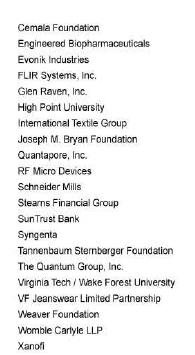 |
Rewinding
to 1991-92,
at bequest of UNC Board of Governors NC Legislature
enacted NC GA § 116‑252.
Piedmont Triad Graduate Engineering Program in
support faculty and graduate students
 involved
in engineering at the campuses of The University of
North Carolina. In doing so UNC Board of Governors
rejected a $20 Million involved
in engineering at the campuses of The University of
North Carolina. In doing so UNC Board of Governors
rejected a $20 Million
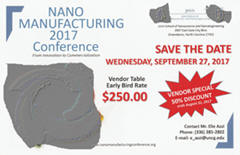 dollar
NCA&T/UNC-G
Engineering and
Science Research Center; "but that center [Piedmont
Triad Engineering
Research
Center] dollar
NCA&T/UNC-G
Engineering and
Science Research Center; "but that center [Piedmont
Triad Engineering
Research
Center] |
|
|
contains no role
for
UNCG,
which
had
hoped to get several doctoral level
programs out of a joint engineering and science research
center with A&T"; |
| |
|
Reported in the Media: "UNCG/A&T
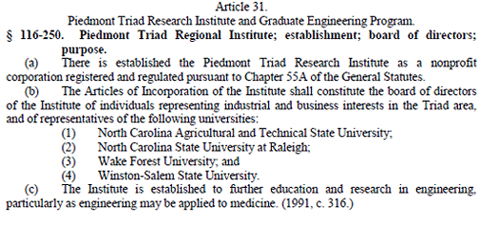 proposal
had won the enthusiastic endorsement of top Greensboro
business leaders. Acting through the Greensboro Development
Corp., they last year commissioned a $300,000 study to
determine what areas of research at UNCG/A&T center could
engage in to the benefit of the Triad economy and its
industries"; and I'm [banker E.S. ``Jim'' Melvin,
chairman of the Greensboro Development Corp convinced it
[Research Center] is the thing to do, but we've got to proposal
had won the enthusiastic endorsement of top Greensboro
business leaders. Acting through the Greensboro Development
Corp., they last year commissioned a $300,000 study to
determine what areas of research at UNCG/A&T center could
engage in to the benefit of the Triad economy and its
industries"; and I'm [banker E.S. ``Jim'' Melvin,
chairman of the Greensboro Development Corp convinced it
[Research Center] is the thing to do, but we've got to
 work
through the university system, build the case for it and get
it high on the
board's priority
list. That's going to take some time.'' reported Jack Scism
TRIAD SCIENTIFIC
RESEARCH CENTER: VIABLE DREAM OR PIE IN THE SKY? , JACK
SCISM, Greensboro News & Record - Monday, July 20, 1992 .
(emphasis added) work
through the university system, build the case for it and get
it high on the
board's priority
list. That's going to take some time.'' reported Jack Scism
TRIAD SCIENTIFIC
RESEARCH CENTER: VIABLE DREAM OR PIE IN THE SKY? , JACK
SCISM, Greensboro News & Record - Monday, July 20, 1992 .
(emphasis added) |
| |
| Reported in
the Media:.."Last
year, the development corporation proposed the idea of
developing a UNCG/A&T Knowledge and Industry Campus, perhaps
in southeast Greensboro. ... This would be the beginning
of our version of N.C. State's Centennial Campus."
[UNCG, A&T University will need to be leaders in the charge
for high-tech industry in the Triad Nov 9, 1998, 12:00am EST
Ken Mayer Editorial Note Key Mayer is a former UNC-G
Board of Trustees Chair. emphasis added |
|
| |
|
|
| |
|
“Activities/Resources: Leverage faculty collaboration at JSNN to
enhance research partnerships between UNCG and NCA&T researchers.
Expected Result, UNCG opportunities in grants previously unavailable
due to limitations in areas of certain research expertise. “ |
| |
The University of North Carolina Board of Governors
authorized HWI UNC Greensboro Nanoscience MS on November 13, 2009
and PhD program in Nanoscience on January 8, 2010,
|
|
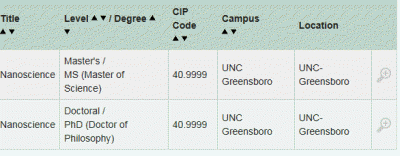 |
requiring UNCG students take relevant courses at the
School of Engineering at North Carolina A&T University and will be
able to work on collaborative projects with faculty in the School of
Engineering”, excluding (The) North Carolina Agricultural and Technical
State university from offering MS and PhD Nanoscience degrees. |
| |
|
The UNC Policy Manual 400.1.1.1[G]
Adopted 05/06/09 |
 |
| |
|
UNC Policy Manual 400.1.1,1[G] amended 05/06/09:
The chancellors of the
constituent institutions shall communicate to General
Administration of the University their intentions with
respect to instructional program development:
-
Notification of intent to plan a new undergraduate or master's
program
-
Request for authorization to plan a new degree program at the
doctoral or first professional level.
-
Request for authorization to establish a new degree program.
|
| |
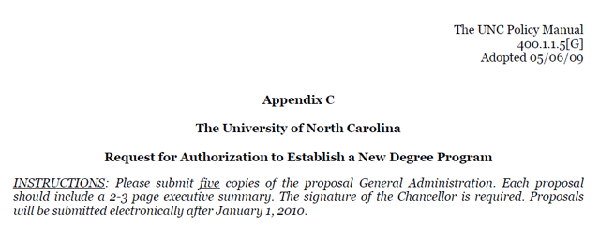 |
 |
|
Chancellor signature
certifies proposal [UNC Policy Manual 400.1.5(G)] to
establish new degree program was reviewed and approved
by the appropriate campus committees and authorities.
|
| |
|
Responding to a Public records request to Dr.
David H. Perrin UNCG Provost & Executive Vice
Chancellor,1/7/11, for a copy of an UNCG
chancellor signed request to establish stand
alone Masters and PhD Nanoscience degrees at
UNCG, Counsel Steve Serck responded
"In
response to your request of 1/7/11, no such
documents as you described exists."
|
| |
|
Unambiguous lack of UNCG Chancellor Dr. Linda Brady signed
Proposals requesting to establish
Nanoscience Professional
Master of Science in Nanoscience and Ph.D.
Nanoscience clearly demonstrated UNCG
had not expressed intentions to establish the degrees, they had not been approved by the faculty
and administration, and were not pursuant UNC
Policies
400.1.1,1[G]and 400.1.1.5[G], and did not
officially originate UNC Greensboro. |
|
| |
| May 2007 UNC Board of Governors established
alleged Joint School of Nanoscience and Nanoengineering
which was to off a joint interdisciplinary Ph.D. degree
and a joint professional science master's degree, at
bogus NCA&T/UNCG Joint Millennial campus Gateway
University Research Park, Inc. |
|
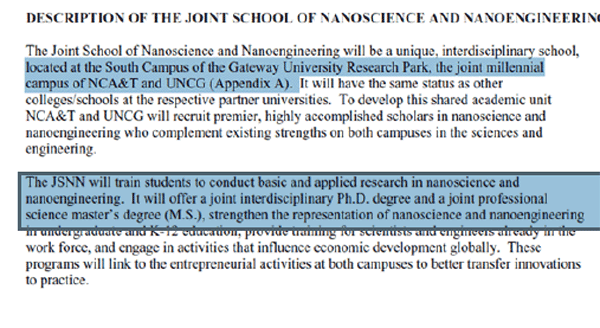 |
| NC A&T and UNCG submitted Request for
Authorization to Establish a New Degree Program , Ph.D.
in Nanoscience dated October 10, 2008 and Master of
Science in Nanoscience dated November 21, 2008 to UNC
General Administration. |
| |
|
|
| |
|
Requests to UNC-GA for a UNCG Request to
Plan a PhD and Request to Establish a
standalone PhD in Nanoscience proscribed
by UNC Guidelines for Academic Program
Development subsection (B) related to
degree authorization Ms. Joni
Worthington (UNC-GA) responded to a
public record request for a UNCG
Chancellor signed request to plan and
establish a PhD in Nanoscience said: “Dr.
Alan Mabe in his capacity as Senior
Vice President for Academic Affairs
determined:
·
UNCG was not required to
submit a new request to plan a Ph.D. in
Nanoscience. The joint proposal
submitted by UNCG and NCA&T was deemed
sufficient for the campus to move
forward with planning a stand-alone
degree program.
·
UNCG was not required to
submit a new request to establish a
Ph.D. in Nanoscience. The joint request
submitted by UNCG and NCA&T, which had
already been recommended for approval by
the UNC Graduate Council, was deemed
sufficient for Board consideration. The
Board of
Governors concurred with that
determination in approving the
establishment of the program. (E-mail
10.08. 2010) “ |
|
| |
|
Contradicting
assertions Dr. Mabe in the capacity of Senior VP for
Academic Affairs etc., are Board approved Guidelines
for Academic Program Development subsection (B.)
Academic Program Development Requiring Authorization or
Action Beyond the Campus Level, which says The
chancellors of the constituent institutions shall
communicate to General Administration of the University
their intentions or requests with respect to
instructional program development for Request for
authorization to plan a new degree program at the
doctoral or first professional level and Request for
authorization to establish a new degree program.
[Guidelines for Academic Program Development [The UNC
Policy Manual 400.1.1.1[G] Adopted 05/06/09]. |
|
 |
|
The "Greensboro Boy" Erskine Bowles
University of North Carolina General
Administration table the NCA&T/UNCG
joint interdisciplinary Ph.D. degree and
joint professional science master's degree
to BOG Planning Committee; excluding NC A&T
from offering Nanoscience degrees and the
JSNN Mission to offer joint
interdisciplinary Ph.D. degree and joint
professional science master's degree. |
|
| |
|
|
| |
|
The UNC Policy Manual 400.1.1.1[G]
 |
A degree program is a program of study in a discipline
specialty that leads to a degree in that distinct specialty
area at a particular level of instruction. As a general
rule, in order to be considered for degree program status, a
course of study should require at least 27 semester hours in
the proposed program area at the undergraduate level; at
least half the number of hours required for the degree at
the master’s level; and at least 21 hours in the proposed
program area at the doctoral level. [Adopted
05/06/09] |
|
| |
|
|
|
|
Elizabeth City State University requested authorization to
establish a BS in Engineering Technology (CIP 15.9999)
in January 2006. The proposed degree will offer
concentrations in “Computer and Information Technology” and
“Mechanical and Automation.” The program will be housed in
the Department of Technology, which currently offers BS
degrees in Industrial Technology and Aviation Science. The
proposed program will incorporate some existing industrial
technology and computer courses into the curriculum. UNC
Board of Governors 8/11/06 authorize BS Engineering
Technology CIP 15.999 to in 2006 Elizabeth City State |
| |
|
|
|
|
| |
| The National Center for
Educational Statistics (NCES) responsible for collecting and
presenting statistical data and information for the nation;
classifies Nanoscience and Nanoengineering as Nanotechnology CIP
15.1601: Engineering technologies and Engineering related fields. |
| |
|
Nanotechnology. Definition: A program that prepares
individuals to apply mathematical, scientific, and engineering
principles and technical skills to manipulate matter at the atomic
and molecular level (in the range of 1-100 nanometers) and to
design, fabricate, and integrate nanoscale structures, devices, and
systems. Includes instruction in materials science,
thermodynamics, nanomaterials, Nano electronics, and nano/micro
device fabrication and testing. [https://nces.ed.gov/search/?q=nano+science]:
|
| |
 |
|
PCG/UNC-NCCCS/UNC
Interim report 3.doc/RB.SP.PC.CR.ATPCC.1/CC.14/10May05
|
|
| |
|
 |
|
University of North Carolina at Greensboro 2008-2009
Profile |
|
| |
|
Notwithstanding the
National Center for Educational Statistics (NCES),
categorized Nanoscience as CIP 15.1601 Engineering
Technologies and Engineering-Related Fields.
UNC General Administration applied
CIP 40.9999 (Physical Science) to UNCG academic
offering . Note UNC-G has a School of Arts and
Science. |
 |
|
| Note
Fall 2005 UNC Presidency transition from
President Molly Broad
to Erskine Bowles. |
|
| |
Professional Master of
Science in Nanoscience
The 33-hour, non-thesis MS in Nanoscience follows the
Professional Master of Science degree model, featuring
course work in Nanoscience and business and an internship to
provide practical experience. |
| |
 |
|
UNC General Administration applied
CIP 40.9999 (Physical Science) to UNCG academic
offering determined UNC
at Greensboro offered only a Master in
Chemistry on the graduate level in the
category of Physical Science. |
|
|
| |
|
Unambiguous a degree in Chemistry is not
a degree in Nanoscience. UNC Greensboro academic inventory was
substantially below the general rule of
at least half the number of hours required for
discipline [Nanoscience] degree at the master’s level.
|
| |
Doctor of Philosophy in Nanoscience
The PhD in Nanoscience requires a minimum of 60 hours and is
designed to prepare students to take positions in industrial,
governmental, or academic research settings by providing a solid
background in Nanoscience theory and experimental techniques through
course work and dissertation research. |
| |
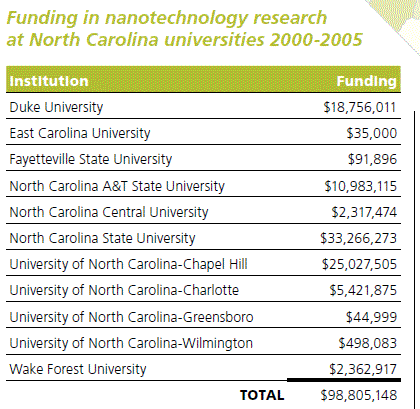 ”The addition
of a doctoral program is not
an easy or simple extension
of the master’s program.
Unlike most master’s
programs, a doctoral program
is research-based. While
doctoral program
requirements routinely
include additional course
work, the central program
requirement is the
dissertation. The topic for
the dissertation normally
derives from discussion with
faculty who are engaged in
research and therefore
knowledgeable about the
“frontier of knowledge” in
the discipline. For a
faculty member to then
properly guide and assist
the student’s dissertation
research, that faculty
member must be an active
researcher. Hence, the
implementation of a doctoral
program must be preceded by
the assembling of faculty
who are conducting
publishable research in that
discipline.
UNIVERSITY OF NORTH CAROLINA
PROGRAM DUPLICATION STUDY
Submitted by James H.
Woodward November 1, 2011
p12] ”The addition
of a doctoral program is not
an easy or simple extension
of the master’s program.
Unlike most master’s
programs, a doctoral program
is research-based. While
doctoral program
requirements routinely
include additional course
work, the central program
requirement is the
dissertation. The topic for
the dissertation normally
derives from discussion with
faculty who are engaged in
research and therefore
knowledgeable about the
“frontier of knowledge” in
the discipline. For a
faculty member to then
properly guide and assist
the student’s dissertation
research, that faculty
member must be an active
researcher. Hence, the
implementation of a doctoral
program must be preceded by
the assembling of faculty
who are conducting
publishable research in that
discipline.
UNIVERSITY OF NORTH CAROLINA
PROGRAM DUPLICATION STUDY
Submitted by James H.
Woodward November 1, 2011
p12]
|
| |
| UNC at Greensboro 10th
among the 11 institutions conducted $45,000 dollars of
Nanotechnology research between 2000 thru 2005. NCA&T was 4th in Funding in Nanotechnology Research
at North Carolina Universities with $11 Million Dollars between
2000-2005.
|
| |
Erskine Bowles
UNC General
Administration
categorizing
Nanoscience Ph.D. as
a Physical Science;
examining UNC
Greensboro curricula
for similar Physical
Science Ph.D.
programs
determined:
UNC Geeensboro offer
no similar Ph.D.
programs.
|
|
|
 |
|
|
|
Clearly UNC
Greensboro academic
inventory was
substantially below
the general rule
at least half the
number of hours
required for the
[Nanoscience] degree
at the master’s
level; and at least
21 hours in the
proposed program
[Nanoscience] area
at the doctoral
level. |
|
Professional
Master
of
Science
in
Nanoscience
The
33-hour,
non-thesis
MS in
nanoscience
follows
the
Professional
Master
of
Science
degree
model,
featuring
course
work in
nanosciences
and
business
and an
internship
to
provide
practical
experience.
It is
designed
for
students
with
strong
backgrounds
in
technical
fields
who seek
additional
specialized
training
to
qualify
them for
positions
in
companies
that
work in
the
field of
nanotechnology. |
| |
Prospectus
Nanoscience
MS
Disciplinary
Foundation
Courses:
The
University
offering
the
course
is
indicated
in
parentheses. |
| |
Engineering
CHEN 655
Nanostructured
Materials
and
Engineering
Applications
(3) (NC
A&T)
ELEN 805
Thin
Film
Technology
for
Device
Fabrication
(3) (NC
A&T)
ELEN 614
Integrated
Circuit
Fabrication
Methods
(3) (NC
A&T)
Physics
PHYS 615
Electromagnetic
Theory I
(3) (NC
A&T
PHYS 620
Quantum
Mechanics
I (3)
(NC A&T)
PHYS 630
Statistical
Mechanics
(3) (NC
A&T)
PHYS 737
Physics
of
Solids
(3) (NC
A&T)
Technology
ECT 614
Microelectronics
Fabrication
Technology
(3) (NC
A&T)
MFG 651
Principles
of
Robotics
(3) (NC
A&T)
MFG 674
Study of
Automation
and
Control
Systems
(3) (NC
A&T)
MFG 760
Advanced
MFG
Process
/Computer
Numerical
Control
(CNC)
(3) (NC
A&T)
MFG 770
Managing
a Total
Quality
System
(3) (NC
A&T)
MFG 780
Reliability
Testing
and
Analysis
(3) (NC
A&T)
MSIT 673
Industrial
Productivity
Measurement
and
Analysis
(3) (NC
A&T)
MSIT 779
Statistical
Research
in
Industrial
Technology
(3) (NC
A&T) |
| |
|
 |
| |
|
Interdisciplinary Degree program:
An Interdisciplinary Degree program involves two or more academic units, either on the same or different campuses, including non-UNC campuses, in a formal agreement to offer a program of study drawing on two or more disciplines that will result in a student being awarded an interdisciplinary degree. If more than one campus is involved in offering the program it would also be a joint degree, emphasis added. |
|
| |
|
UNCG
Nanoscience
degrees
were
stand-alone
(non-joint)
which
pursuant
UNC
Board of
Governors
Policy
for
Interdisciplinary
Degrees
there
was
no
formal
agreement
between
UNC G
and
NCA&T to
allow
UNCG
Students
to
access
NCA&T
Engineering
circular
and
research,
Therefore
no
education
foundation
for UNCG
to offer
Nanoscience
Master
and
Ph.D.
degrees
bases on
UNCG
Students
to
access
NCA&T
Engineering
circular
and
research. |
|
|
|
|
Unambiguous
UNC-Greensboro
academic inventory
of Doctoral degrees
in English:
Psychology:
Education:
Counseling;
Geography, Nursing;
Nutrition;
Performance; Human
Development and
Family Studies;
Exercise and Sport
Science; Curriculum
and Teaching;
Information systems
and Operations
management;
consumer, apparel,
and Retail studies;
and Music is ill
prepared to offer “A
program that
prepares individuals
to apply
mathematical,
scientific, and
engineering
principles and
technical skills to
manipulate matter at
the atomic and
molecular level (in
the range of 1-100
nanometers) and to
design, fabricate,
and integrate
nanoscale
structures, devices,
and systems. |
|
|
|
|
|
|
|
| |
| The National Center for
Educational Statistics (NCES) responsible for collecting and
presenting statistical data and information for the nation;
classifies Nanoscience and Nanoengineering as Nanotechnology CIP
15.1601: Engineering technologies and Engineering related fields. |
| |
|
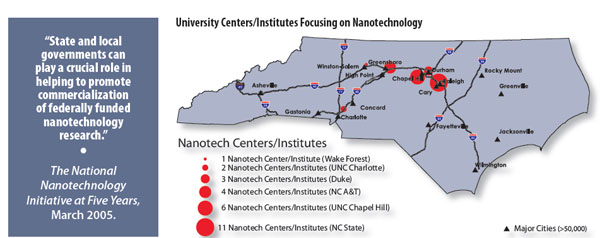
|
 Historical
Black Land Grant NCA&T was listed as University focus on
Nanotechnology May
2005. Historical
Black Land Grant NCA&T was listed as University focus on
Nanotechnology May
2005.
Cross town Historical White UNC Greensboro was
not listed as a University focused on Nanotechnology. |
|
| |
|
Dr. Alan Mabe
dated April 28, 2009
to Ed Planning,
Ph.D. Memorandum
degree
proposals indicate
NC A&T Nanoscience
and Material Science
(Nanoengineering). |
|
|
 |
| |
|
The UNC Policy Manual 400.1.1.1[G]
 |
A degree program is a program of study in a discipline
specialty that leads to a degree in that distinct specialty
area at a particular level of instruction. As a general
rule, in order to be considered for degree program status, a
course of study should require at least 27 semester hours in
the proposed program area at the undergraduate level; at
least half the number of hours required for the degree at
the master’s level; and at least 21 hours in the proposed
program area at the doctoral level. [Adopted
05/06/09] |
|
| |
|
 |
|
PCG/UNC-NCCCS/UNC
Interim report 3.doc/RB.SP.PC.CR.ATPCC.1/CC.14/10May05
|
|
| |
|
Historical
black North
Carolina
A&T, as one
of the
state's two
land grant
institutions,
has programs
through the
doctoral
level. Its
programs
include
engineering,
arts and
sciences,
agricultural
and
environmental
sciences,
business and
economics,
education,
nursing,
technology,
and
graduates
studies.
“The
expected
roles of a
land-grant
institution,
is teaching
agriculture
and
engineering,
and
providing
cooperative
extension
services” . |
 |
|
UNC Board of Governors January 2007
authorized UNC Charlotte, which has an Engineering
School, to offer a Ph.D. in Nanoscale Science. Offering
Nanoscale Science was not a Substantial Change as
defined by the SACS for UNC Charlotte. Nov. 2012 UNC
Board of Governors authorized a Master’s in
Nanoengineering to Land Grant Institution NC State,
which has an Engineering. Offering Nanoengineering was
not a Substantial
Change as defined by
the SACS for NC
State.
Consistent
with other
engineering
schools in
the UNC
System
offering
Nanoscience
and
Nanoengineering
(Material
Science)
programs
are not
Substantial
Changes as
defined by
the SACS and
consistent
with the
education,
curricular,
mission and
goals of NC
A&T State
University. |
|
| |
|
 ”The addition
of a doctoral program is not
an easy or simple extension
of the master’s program.
Unlike most master’s
programs, a doctoral program
is research-based. While
doctoral program
requirements routinely
include additional course
work, the central program
requirement is the
dissertation. The topic for
the dissertation normally
derives from discussion with
faculty who are engaged in
research and therefore
knowledgeable about the
“frontier of knowledge” in
the discipline. For a
faculty member to then
properly guide and assist
the student’s dissertation
research, that faculty
member must be an active
researcher. Hence, the
implementation of a doctoral
program must be preceded by
the assembling of faculty
who are conducting
publishable research in that
discipline. [2] ”The addition
of a doctoral program is not
an easy or simple extension
of the master’s program.
Unlike most master’s
programs, a doctoral program
is research-based. While
doctoral program
requirements routinely
include additional course
work, the central program
requirement is the
dissertation. The topic for
the dissertation normally
derives from discussion with
faculty who are engaged in
research and therefore
knowledgeable about the
“frontier of knowledge” in
the discipline. For a
faculty member to then
properly guide and assist
the student’s dissertation
research, that faculty
member must be an active
researcher. Hence, the
implementation of a doctoral
program must be preceded by
the assembling of faculty
who are conducting
publishable research in that
discipline. [2]
NCA&T was 4th in Nanotechnology Research at North Carolina
Universities with $11 Million Dollars between 2000-2005 compared to
UNC Greensboro 10th with $44, 999.
|
|
|
Nanotechnology is Experimental
NCA&T State University has been funded at an average rate of $3-5 million per year in the area of nanoscience and nanotechnology. Most of the research in nanoengineering is done in the Center for 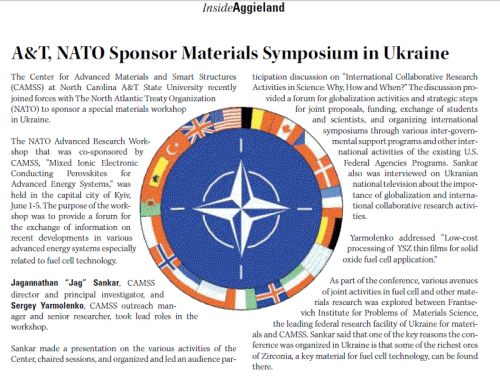 Advanced Materials and Smart Structures (CAMSS). Several Centers and projects are under CAMSS, including the NSF Center for Research Excellence in Science and Technology (CREST), the DoD Center for Nanoscience, Nanomaterials and Multifunctional Materials (CNN) for Homeland Security, the NSF Nanoscale Science and Engineering Center (NSEC), the NSF project on US/Europe Materials Collaboration: Self-Organized Nanostructured Thin Films for Catalysis, the NSF project on Nanoscale Interdisciplinary Research Teams (NIRT), the NSF Major Research Instrumentation for Nanoengineering Research, and the NSF Nanotechnology Undergraduate Education (NUE) program. CAMSS also facilitates many of the materials research activities of the NASA-National Institute for Aerospace (NIA). In addition, the Center for Composite Materials Research (CCMR) does research in nano-enhanced composite materials and the Army Center of Excellence for Battlefield Capability Enhancements (Flexible Displays) does research in material characterization and development of novel displays. Advanced Materials and Smart Structures (CAMSS). Several Centers and projects are under CAMSS, including the NSF Center for Research Excellence in Science and Technology (CREST), the DoD Center for Nanoscience, Nanomaterials and Multifunctional Materials (CNN) for Homeland Security, the NSF Nanoscale Science and Engineering Center (NSEC), the NSF project on US/Europe Materials Collaboration: Self-Organized Nanostructured Thin Films for Catalysis, the NSF project on Nanoscale Interdisciplinary Research Teams (NIRT), the NSF Major Research Instrumentation for Nanoengineering Research, and the NSF Nanotechnology Undergraduate Education (NUE) program. CAMSS also facilitates many of the materials research activities of the NASA-National Institute for Aerospace (NIA). In addition, the Center for Composite Materials Research (CCMR) does research in nano-enhanced composite materials and the Army Center of Excellence for Battlefield Capability Enhancements (Flexible Displays) does research in material characterization and development of novel displays. In 2003 A&T, NATO Sponsor Material Symposium in Ukraine.. |
|
|
|
|
|
Unlike land grant
cross-town
historical Black
NCA&T with strong
programs in
engineering offering
Nanoscience
constituted a
Substantive Change
as defined by SACS
from previous
approved circular at
historical white
women UNCG with
strong programs in
liberal Arts.
(UNCG) Rebecca Adams
to (SACS) Tom
Benberg: Sarah
Armstrong Subject:
Request for
interpretation of
accuracy of
nanoscience message,
April 13, 2010:
The bottom line,
however, is that we
need to submit a
full prospectus and
need to do so as
soon as possible.
This request will be
for approval to
initiate a new
off-campus site
(South Campus) and
to initiate a new
degree program (MS
in Nanoscience) at
that site.
Contrary to previous
interpretations,
both represent
substantive changes..
Due to the
confusion, they are
willing to waive the
requirement that we
do so 6 months in
advance and will
usher it though the
approval process in
a timely way so that
we can accept
students into UNCG's
MS in Nanoscience
program next fall. |
|
|
|
UNC BOG
Committee
on
Budget
and
Finance,
April
2006,
approved
recommending
1.3
million
dollars
for
planning
a
Biotechnology
Building
at NCA&T
to full
BOG.
Proposed
facility
would
enable
NCA&T to
support
ongoing
and
expanding
research
activities
in
bioengineering,
biotechnology,
and
biomedicine.
|
|
 |
NC A&T' biotechnology program is interdisciplinary and will incorporate research activities currently housed in the College of Engineering, College of Arts and Sciences, and School of Agriculture and Environment Sciences. The Total cost of this project is $25 Million dollars. |
|
|
|
A&T is known for its
engineering and
agricultural
programs and UNCG’s
background is
nursing and the
humanities “. [1] |
|
|
|
Unambiguous UNC
Policy on Academic
Program Planning
conclusion if it had
been implemented
would indicate : |
(1) number,
location, and
mode of delivery
of existing
programs,
(2) the
relation of the
program to the
distinctiveness
of the campus
and the mission
of the campus,
(3) the
demand for the
program in the
locality,
region, or State
as a whole,
(4) whether
the program
would create
unnecessary
duplication,
(5)
employment
opportunities
for program
graduates,
(6) faculty
quality and
number for
offering the
program,
(7) the
availability of
campus resources
(library, space,
labs, equipment,
external
funding, and the
like) to support
the program,
(8) the
number and
quality of
lower-level and
cognate programs
for supporting
the new program,
(9) impact of
program decision
on access and
affordability,
(10) the
expected quality
of the proposed
degree program,
|
|
over whiningly
indicated
Nanoscience and
Nanoengineering
degrees be
established at
HBCU (The) North
Carolina
Agricultural and
Technical State
university
"not"
University of North
Carolina Greensboro. |
|
|
|
|
Why is
across-town Liberal
Art UNC Greensboro
with programs in
music and nursing,
requiring relevant
courses be taken at
the School of
Engineering at North
Carolina A&T
University and will
be able to work on
collaborative
projects with
faculty in the
School of
Engineering”, except
for unvarnished
racism offering
Nanotechnology
degrees? |
|
|
|
|
[1]
MARTA HUMMEL Staff
Writer, A&T ENTICES
SCIENCE CENTER TO
GREENSBORO - N.C.
A&T AND THE USDA
HOPE THEIR AGREEMENT
WILL MAKE GREENSBORO
A HUB FOR BIOFUELS
AND FARMING
RESEARCH. Greensboro
News & Record
(NC)-September 20,
2004
[2]
UNIVERSITY OF NORTH CAROLINA
PROGRAM DUPLICATION STUDY
Submitted by James H.
Woodward November 1, 2011
p12]
|
|